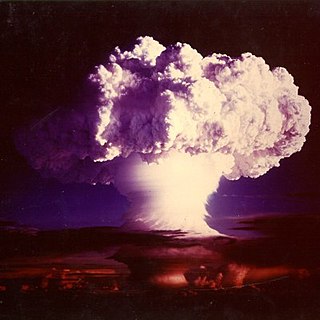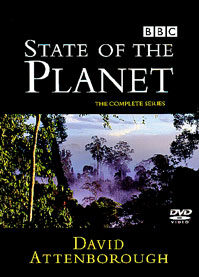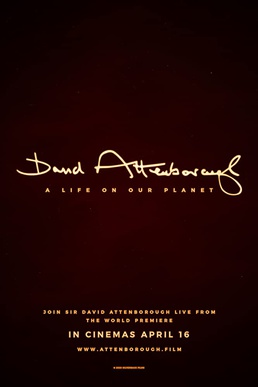
The Holocene extinction, or Anthropocene extinction, is the ongoing extinction event caused by humans during the Holocene epoch. These extinctions span numerous families of plants and animals, including mammals, birds, reptiles, amphibians, fish, and invertebrates, and affecting not just terrestrial species but also large sectors of marine life. With widespread degradation of biodiversity hotspots, such as coral reefs and rainforests, as well as other areas, the vast majority of these extinctions are thought to be undocumented, as the species are undiscovered at the time of their extinction, which goes unrecorded. The current rate of extinction of species is estimated at 100 to 1,000 times higher than natural background extinction rates and is increasing. During the past 100–200 years, biodiversity loss and species extinction have accelerated, to the point that most conservation biologists now believe that human activity has either produced a period of mass extinction, or is on the cusp of doing so. As such, after the "Big Five" mass extinctions, the Holocene extinction event has also been referred to as the sixth mass extinction or sixth extinction; given the recent recognition of the Capitanian mass extinction, the term seventh mass extinction has also been proposed for the Holocene extinction event.

Sir David Frederick Attenborough is a British broadcaster, biologist, natural historian and author. He is best known for writing and presenting, in conjunction with the BBC Natural History Unit, the nine natural history documentary series forming the Life collection, a comprehensive survey of animal and plant life on Earth.

Human extinction is the hypothetical end of the human species, either by population decline due to extraneous natural causes, such as an asteroid impact or large-scale volcanism, or via anthropogenic destruction (self-extinction), for example by sub-replacement fertility.

Mark Lynas is a British author and journalist whose work is focused on environmentalism and climate change. He has written for the New Statesman, The Ecologist, Granta and Geographical magazines, and The Guardian and The Observer newspapers in the UK, as well as the New York Times and Washington Post in the United States; he also worked on and appeared in the film The Age of Stupid. He was born in Fiji, grew up in Peru, Spain and the United Kingdom and holds a degree in history and politics from the University of Edinburgh. He has published several books including Six Degrees: Our Future on a Hotter Planet (2007) and The God Species: Saving the Planet in the Age of Humans (2011). Lynas is research and climate lead for the Alliance for Science and is co-founder of the pro-science environmental network RePlanet. Since 2009 he has been climate advisor to former president of the Maldives Mohamed Nasheed, and he currently works to assist Nasheed with the Climate Vulnerable Forum, a group of the world's most climate-vulnerable 58 developing countries. He has co-authored a number of peer-reviewed scientific publications, including a 2021 paper which found that the consensus on anthropogenic climate change in the scholarly literature now exceeds 99%.

A nature documentary or wildlife documentary is a genre of documentary film or series about animals, plants, or other non-human living creatures. Nature documentaries usually concentrate on video taken in the subject's natural habitat, but often including footage of trained and captive animals, too. Sometimes they are about wildlife or ecosystems in relationship to human beings. Such programmes are most frequently made for television, particularly for public broadcasting channels, but some are also made for the cinema. The proliferation of this genre occurred almost simultaneously alongside the production of similar television series which is distributed across the world.

State of the Planet is a three-part environmental documentary series, made by the BBC Natural History Unit, transmitted in November 2000. It is written and presented by David Attenborough, and produced by Rupert Barrington. It includes interviews with many leading scientists, such as Edward O. Wilson and Jared Diamond. Each of the programmes attempts to find answers to the potential ecological crisis that threatens the Earth.
Human overpopulation describes a concern that human populations may become too large to be sustained by their environment or resources in the long term. The topic is usually discussed in the context of world population, though it may concern individual nations, regions, and cities.

Are We Changing Planet Earth? and Can We Save Planet Earth? are two programmes that form a documentary about global warming, presented by David Attenborough. They were first broadcast in the United Kingdom on 24 May and 1 June 2006 respectively.

References to climate change in popular culture have existed since the late 20th century and increased in the 21st century. Climate change, its impacts, and related human-environment interactions have been featured in nonfiction books and documentaries, but also literature, film, music, television shows and video games.

Saving THE Planet is a season of nature documentaries with a conservation theme, screened on BBC Television in 2007 to mark the 50th anniversary of its specialist factual department, the BBC Natural History Unit.

Frozen Planet is a 2011 British nature documentary series, co-produced by the BBC ZDF and The Open University. It was filmed by the BBC Natural History Unit. The production team, which includes executive producer Alastair Fothergill and series producer Vanessa Berlowitz, were previously responsible for the award-winning series The Blue Planet (2001) and Planet Earth (2006), and Frozen Planet is billed as a sequel of sorts. David Attenborough returns as narrator. It is distributed under licence by the BBC in other countries, Discovery Channel for North America, ZDF for Germany, Antena 3 for Spain and Skai TV for Greece.
Attenborough: 60 Years in the Wild is a three-part BBC documentary series chronicling the 60 years career making wildlife programmes of Sir David Attenborough. The first hour-long programme, titled "Life on Camera" was broadcast on Friday 16 November 2012 on BBC Two at 9pm. The second part, "Understanding the Natural World" and third and final part, "Our Fragile Planet" were broadcast on following Fridays, 23 and 30 November 2012.
Speculative evolution is a subgenre of science fiction and an artistic movement focused on hypothetical scenarios in the evolution of life, and a significant form of fictional biology. It is also known as speculative biology and it is referred to as speculative zoology in regards to hypothetical animals. Works incorporating speculative evolution may have entirely conceptual species that evolve on a planet other than Earth, or they may be an alternate history focused on an alternate evolution of terrestrial life. Speculative evolution is often considered hard science fiction because of its strong connection to and basis in science, particularly biology.

Our Planet is a British nature documentary series made for Netflix. The series is narrated by David Attenborough and produced by Silverback Films, led by Alastair Fothergill and Keith Scholey, who also created BBC documentary series Planet Earth, Frozen Planet and The Blue Planet, in collaboration with the conservation charity World Wildlife Fund (WWF). The soundtrack was composed by Steven Price.

Seven Worlds, One Planet is a television documentary series from the BBC Natural History Unit. The seven-part series, in which each episode focuses on one continent, debuted on 27 October 2019 and is narrated and presented by naturalist Sir David Attenborough. Over 1,500 people worked on the series, which was filmed over 1,794 days, with 92 shoots across 41 countries.

David Attenborough: A Life on Our Planet is a 2020 British documentary film narrated by David Attenborough and produced and directed by Jonnie Hughes. The film acts as a "witness statement", through which Attenborough shares first-hand his concern for the current state of the planet due to humanity's impact on nature and his hopes for the future. It was released on Netflix on 4 October 2020, along with a companion book A Life on Our Planet.

Extinction: The Facts is a 2020 documentary film by the natural historian David Attenborough which aired on the BBC. It depicts the continuing sixth mass extinction, caused by humans, and the consequences of biodiversity loss and climate change. It also suggests positive action which can be taken to halt or reverse these effects. With a peak viewership of roughly 4.5 million on its premiere, the programme received positive critical reception.

Breaking Boundaries: The Science of Our Planet is a 2021 documentary film directed by Jon Clay, and presented by David Attenborough and Johan Rockström.

Scenarios in which a global catastrophic risk creates harm have been widely discussed. Some sources of catastrophic risk are anthropogenic, such as global warming, environmental degradation, and nuclear war. Others are non-anthropogenic or natural, such as meteor impacts or supervolcanoes. The impact of these scenarios can vary widely, depending on the cause and the severity of the event, ranging from temporary economic disruption to human extinction. Many societal collapses have already happened throughout human history.

The Green Planet is a 2022 nature documentary series on plants and their relationship with animals, humans and the environment. It was produced by BBC Studios Natural History Unit and narrated and presented by David Attenborough.

















